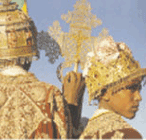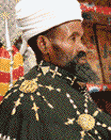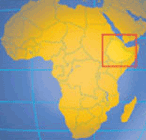|
|
|
|
|

Ethiopian wins Bombardier's Airline Reliability Performance
Award
10 May 2012
For the second consecutive year, Ethiopian Airlines has
won the 2011 Annual Airline Reliability Performance
Award from the Bombardier Aerospace. Ethiopian achieved
the highest overall dispatch reliability rating and
placed first overall in the Q-400 product category for
the Middle East and Africa region.
Chief operating officer of Ethiopian Airlines, Ato
Mesfin Tassew, received the award at the annual awards
gala dinner held on 30 April 2012 at the Disney Atlantic
Dance Hall in Orlando, Florida (USA).
With the introduction of the Q-400 aircraft, Ethiopian
not only has enhanced the comfort and safety of its
passengers but also effectively addressed the need for
additional capacity spurred by the country's double
digit economic growth. Through enhancing its domestic
and regional services further, Ethiopian Airlines also
connects regional states with neighbouring countries.
Ethiopian Airlines owns eight Bombardier Q-400s which
services its domestic and regional routes. The airline
recently ordered five more Q-400s, upgraded with seven
business class seats, bigger baggage compartments and
two lavatories.
The Bombardier Airline Reliability Performance Awards
are presented annually to operators of CRJ services and
Q-400 series aircraft in recognition of outstanding
dispatch reliability. Each winner must succeed in
delivering an average dispatch reliability rate of 99%
or higher on revenue passenger flights during 2011 and
the highest dispatch reliability performance in their
respective product class and region.
About Ethiopian Airlines
Ethiopian Airlines, one of the largest and fastest
growing airlines in Africa, made its maiden flight to
Cairo in 1946. With the addition of new flight services
to Hangzhou, Milan and Madras, Ethiopian will provide
dependable services to 63 international destinations
spanning four continents.
Recently, Ethiopian won the 2011 'AFRICAN CARGO AIRLINE
OF THE YEAR' Award for its excellence in air cargo.
Ethiopian won the NEPAD Transport Infrastructure
Excellence Awards 2009 and the 2009 'Airline of the
Year' award from the African Airlines Association (AFRAA).
In August, 2008, Ethiopian won "the 2008 Corporate
Achievement Award" of Aviation & Allied Business for
setting the pace towards the development and growth of
the African aviation industry. Ethiopian was also the
first African carrier to win the 2008 Brussels Airport
Company Award in recognition of its distinguished long
haul operations witnessed through the introduction of
new routes, new products, and close cooperation with
Brussels Airport in marketing activities.

Ethiopian Airlines announces flights to Seychelles
Addis Ababa, Ethiopia (WIC) - Ethiopian Airlines
announced the launch of nonstop flights to the Seychelles
from Addis Ababa beginning 01 April 2012.
Posted by Markos
Berhanu on Apr 5th, 2012
The Airlines is pleased to begin services to Seychelles,
which is famous for its beauty and the home of two UNESCO
designated World Heritage Sites, according to Tewolde
Gebremariam, Chief Executive Officer of Ethiopian.
The CEO underscored that the Airlines is among the
leading transporters and has fulfilled the necessary
safety requirements.
Ethiopian Airlines used to fly to the Seychelles 32
years ago, which was disrupted due to capacity and
other reasons.
In a harsh time where many airlines companies are
closing due to the rising fuel cost, Ethiopian
Airlines has managed to fly to more destinations
with its established cost effective system to fulfil
its aim of becoming a globally leading one by 2025.
Culture and Tourism Minister of the Seychelles,
Alain St. Ange for his part said Ethiopian Airlines
flight to his country will ensure mutual benefits.
According to ERTA, Ethiopian Airlines has introduced
complete travel packages to the Seychelles, which
include airfare, multiple-night stays at a variety
of properties and unforgettable activity offerings.
Seychelles would be the 41st African destination and
the 66th globally for Ethiopian Airlines.

CELEBRATED OVER ONE HUNDRED YEARS OF
ETHIOPIAN-UNITED STATES RELATIONS
The year 2007 marks the celebration of
mutual respect and cordial diplomatic
relations between Ethiopia and the United
States for over a century. Commemorative
celebrations were held throughout the United
States recognizing the centennial of the
formal signing of diplomatic relations
between Ethiopia and the United
States. Programs and panel discussions were
held at Stanford University and Howard
University among others, to identify areas
of mutual cooperation and unity between
Ethiopians and African-Americans. The
overall purpose of the centennial
commemoration is to not only recognize the
many years of diplomatic relations but to
draw lessons from the long experiences
between the two countries. Further, it is
hoped that the history of relationships
between Ethiopia and the United States and
their collective experiences will ultimately
benefit scholars of history and political
science and practitioners in foreign
diplomacy but most importantly increase
interpersonal relationships between the
people of Ethiopia and the United States.
The first known Ethiopians visited America
in 1808, when merchants from Ethiopia
arrived at New York’s port.
A formal relationship was established
between Ethiopia and the United States on
December 27, 1903 by Emperor Menelik of
Ethiopia and Commissioner Robert P. Skinner
representing President Theodore Roosevelt of
the United States.
Thus the initial treaty between the two
countries representing a truly historic
diplomatic document was signed, known as the
"Treaty of Amity and Commerce", which
accorded Ethiopia the status of "Most
Favored Nation" (MFN) and consequently led
to full-fledged diplomatic relations.
The foundation for this unique relationship
was perhaps laid on the eve of 1886, when
Ethiopia successfully stopped the European
scramble for Africa at the gates in
northernmost Ethiopia.
In 1919 an official Ethiopian goodwill
mission was sent to the United States, the
first African delegation of diplomats, in
hopes of creating amicable ties with the
American people and government. The
four-person delegation included Ras Tesema
Nadew, the nephew of Empress Zawditu and
Commander of the Imperial Army, along with
Blattengeta Heruy Welde Sellase, Mayor of
Addis Ababa, Kentiba Gebru, Mayor of Gondar,
and Tsehafi Yaqob, Ras Tesema Nadew’s
secretary.
In subsequent years and decades, Emperors
Menelik and Haile Selassie showed strong
interest in the immediate promotion of
Ethiopia's unique relationship with the
United States.
After his official coronation, Emperor Haile
Selassie sent forth the first wave of
Ethiopian students to continue their
education abroad. Almost a dozen Ethiopian
students likewise went to the United States.
They included Makonnen Desta, who studied
anthropology at Harvard, and later became an
interim Ethiopian Minister of Education,
Makonnen Haile, who studied finance at
Cornell, and Ingida Yohannes, veterinary
medicine at New York. Three other students,
Melaku Beyen, Besha Worrid Hapte Wold and
Worku Gobena, went to Muskingum, a
missionary college in Ohio, two of them
later transferring to Ohio State University.
Melaku Beyan, who was one of the two who
attended Ohio State, later received his
medical degree at Howard Medical School in
Washington, D.C.
Moreover, more than one million
Ethiopian-Americans are working very hard to
revitalize and energize a greater
Ethiopian-American friendship by building
bridges that connect the two peoples ever
closer. The vital interests of both Ethiopia
and the United States have been kept alive
and forged in times of both peace and
adversity, and it is the fervent belief of
many Ethiopians and Ethiopian-Americans that
the United States, as in times past, will
stand by Ethiopia as the two nations
continue into the next one hundred years of
an enduring partnership.
By and large, successive leaders of both
countries have been keeping this important
fact at the forefront of their foreign
policy making. It is truly remarkable that
the substance of this strategic partnership
and shared destiny between the two countries
has remained constant over more than a
century.
|
![]()









